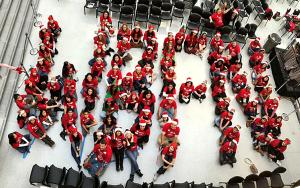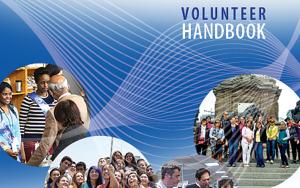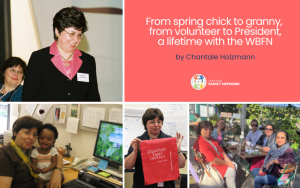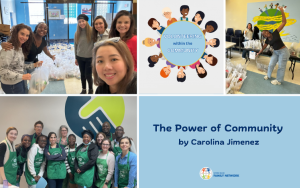
Hely is a WBG spouse with high energy, which she needs because she is a natural and enthusiastic organizer. She approaches life’s challenges by figuring out how to make them work logistically; and by taking care of the logistics, she accomplishes a lot more. One challenge is that she has four daughters, and another is that she and her husband like to be together and with their kids, which includes traveling together. When they lived in Pakistan and the girls were smaller, every trip was a family one, even those where Hely accompanied her husband on in-country missions. Naturally, the key to Hely’s success is planning. Here are some of her strategies.
For car trips in Pakistan, Hely would sit in the back with the baby, the third next girl up in age, and the eldest two daughters. The second third eldest daughter, sat in the front with her father, who was driving. This was the precise division needed to eliminate sibling arguing. Five hours was the longest trip they took, with one stop halfway. The diaper bag was best practice. Nothing was left to chance, and even when the car broke down once by the side of the highway in the high heat, Hely wasn’t caught off guard. The number of car trips they took together? Ten!
There was also a plan for visiting shopping malls in Pakistan. Hely and her husband, a Pakistani national, would show the girls the exit, and then identify a meet-up place for them to go if they got lost. The older girls had to know their parents’ and grandparents’ phone numbers by heart. Hely and her husband would take it in turns to shop for themselves, or Hely would return on her own later. Stories of lost children and/or melt-downs? None.
The family also traveled to different countries Thailand, Philippines and the US for vacations. Plane trips took an extra level of planning. Hely would look at the seating map and then determine ahead of time who was going to sit where. She would then brief each child on the plan and would make sure they understood it and were ok with it. Hely would put the younger ones in diapers on the flight even if they were toilet-trained as she was worried and concerned about the conditions of the hygiene of the restrooms in-flight bathroom and the potential for an accident. (Hely has a background in healthcare and education.) Hely is a nurse, and she does not like public bathrooms, especially on planes.
About four years ago the family was invited to a wedding in the US.The trip to the US was for a family wedding. As Hely was planning for the trip she decided that she would to bring everything they needed or might possibly need so they would not have to spend any time shopping, and because she was worried about the availability and specific costs of items in the US. Not one item was forgotten in the entire trip. They had sixteen pieces of luggage, and successfully managed not to spend an extra dollar. Hely admits that the hotel rooms were “pretty congested”. One thing Hely always does in a hotel room is to take a towel and put it on a table for all the medications and baby items. Everyone observes the rule that the towel is never touched.
When they lived in Pakistan, Hely had ample help in the house and was able to resume working outside the home. She determined that working in the girls’ school would be the easiest way to combine her career and looking after the family, and so became a third grade teacher there.She is from Philippines and had been both a nurse and instructor of nurses there, but neither of these jobs fitted in with managing a large, young family, so she changed careers. She went to the girls’ school and asked if her resume was strong enough to apply for a teaching position. Soon she was in charge of third grade to which she was accepted. She could see the elder girls inside the school during the day, and the younger ones in the preschool next door. This choice of career helped her to manage her large family and work at the same time.
Hely and her family relocated to Washington one year ago. She and her husband found a house near the metro and within walking distance to the younger girls’ school. When Hely is volunteering at the WBFN for the Welcoming Team, the elder girls, who finish school first, pick up their sisters. Hely doesn’t have a driving license yet, which in a Washington suburb would be a serious challenge to anyone, but not to Hely. The shopping is done once on the weekend with her husband. All the meals, including school lunches and snacks, are planned to the last ingredient. In Pakistan they had someone to clean the house, but here they all share those duties. Even overseeing the chores of four children requires organization.
Living in the US has brought further challenges. One year has not been enough time for Hely and her husband to feel comfortable yet with some aspects of the culture as any move requires certain adjustmentsto Hely’s planning talents. Their eldest girl is beginning to want some independence, but neither Hely nor and her husband feel that younger teenagers should be very careful when out on their own considering risks of being out in public on their own. When her daughter wants to meet her friends, Hely combines it with a family excursion. Everyone goes together to the shopping mall or cinema, and while the eldest is with her friends, Hely is close by with the younger ones.
The secret to successful planning, says Hely, is communication. Everyone needs to know in advance what the plan is and what they are responsible for. If there is a problem, Hely talks it through and makes sure to listen to her children’s feelings. A second vital element to the success of planning is Hely’s husband. He and Hely work as a team. Their goals and values are aligned so that organizing the family is a natural outcome of these shared approaches. For Hely and her husband, organization is about more than logistics. It’s about keeping their family together.






